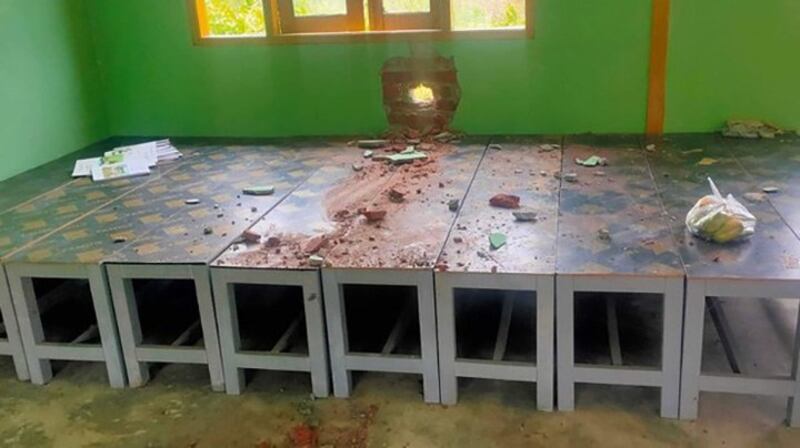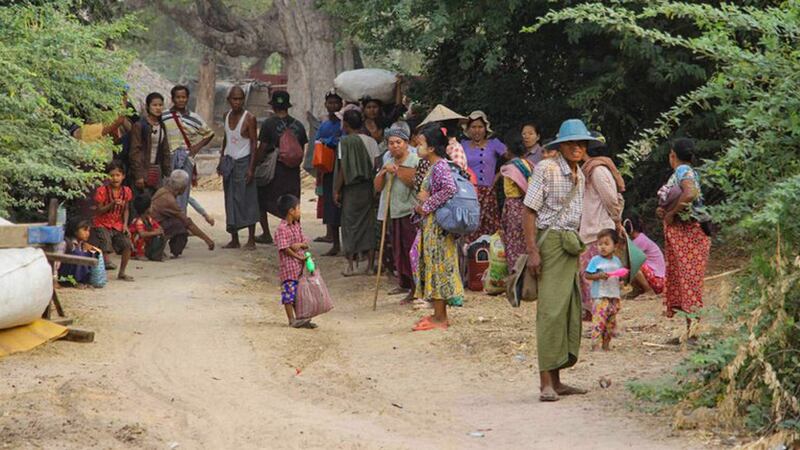Myanmar’s military has stepped up attacks on schools run by anti-junta paramilitaries and ethnic armed groups, according to a Thai-based NGO, in what an aid worker says is a bid to force children to study under its education system.
While the military began using airstrikes against schools following its successful coup d’etat in February 2021, the number of attacks increased ahead of the start of this year’s school season on June 1, the Assistance Association for Political Prisoners said in a statement.
Several of the airstrikes took place in Kani and Kale townships in Sagaing region, as well as in Tanintharyi region – two hotbeds of anti-junta resistance since the takeover – the June 5 statement said, labeling such attacks “war crimes.”
“The junta has definitely been committing war crimes like these – everyday they violate what the International community has prohibited,” said an AAPP official, speaking to RFA Burmese on condition of anonymity, citing security concerns.
“The schools they attacked are in areas controlled by the [People’s Defense Force] and other revolutionary forces where they have no authority.”
Among the attacks was one by military helicopters on a school in Kale’s Shu Khin Thar village on June 5 that a local PDF group known as the CNO Upper Chindwin Region said took place while village elders were holding a meeting. The attack killed one person and injured four others, the group said in a statement, adding that the junta has ordered such strikes to “threaten families” who send their children to village schools run by anti-junta groups.
The AAPP said it had also documented a June 5 attack by a junta Mi-35 helicopter on a school in Sagaing’s Kani township that injured two children and damaged the building, as well as nearby homes. There was no fighting or military activities taking place at the time.
And early in the morning of June 6, military fighter jets dropped bombs on San Pha Lar village in Kayin state’s Kawkareik, destroying the village school and four houses. Local media reported that teachers and students in the village are now too frightened to go to school.

A resident of Kani township who is aware of the incident but declined to be named called the junta's deliberate targeting of schools “a heinous act.”
“Children are entitled to freedom of education,” the resident said. “School buildings can never be military targets.”
In the months of April and May alone, the AAPP said the military carried out 31 airstrikes and fired 184 barrages of heavy artillery into areas controlled by the rebel Karen National Union’s 6th Brigade, damaging three schools, a monastery, two Christian churches, two clinics and 387 civilian homes. The attacks forced 23,021 civilians to flee, according to the KNU.
Targeting non-junta schools
Japan Gyi, co-chair of the Relief Group for People Displaced by Conflict (Kale), told RFA that the military regime is intentionally targeting schools that are not under its control.
“Their education system is a complete failure and the people know it very well,” he said. “But, just as all dictators, they are forcing people to study under their system and live under their management.”
Attempts by RFA to contact junta Deputy Information Minister Major Gen. Zaw Min Tun for comment on the school attacks went unanswered on Wednesday.
Residents of Sagaing and Magway regions and Chin and Kayin states have told RFA that they are being forced to build bomb shelters at schools because of the threat of airstrikes and urged the international community to intervene.
Armed resistance groups and NGOs have called for a ban on companies that sell jet fuel to Myanmar’s military, but the junta continues to carry out airstrikes across the country.

In a statement earlier this week, Myanmar’s shadow National Unity Government said that junta forces killed 129 civilians in the month of May alone, including 19 children. The civilians were killed by junta airstrikes, artillery or while in detention, the statement said, in Kachin, Kayah, Kayin, Chin, Mon and Shan states, as well as Mandalay, Sagaing, Magway and Bago regions.
An information official in Sagaing’s Khin-U township who declined to be named told RFA that civilian deaths have increased there and other regions as anti-junta forces have become better armed and more successful in ground engagements with the military.
“Due to junta aggression, innocent civilians including the elderly, pregnant women, mothers with newborn babies and children have had to flee their homes when fighting breaks out,” the official said. Many elderly residents have died while trying to flee or were burned to death in military arson attacks, he added.
According to the AAPP, authorities have killed at least 3,622 civilians since the coup.
Translated by Myo Min Aung. Edited by Joshua Lipes and Malcolm Foster.

